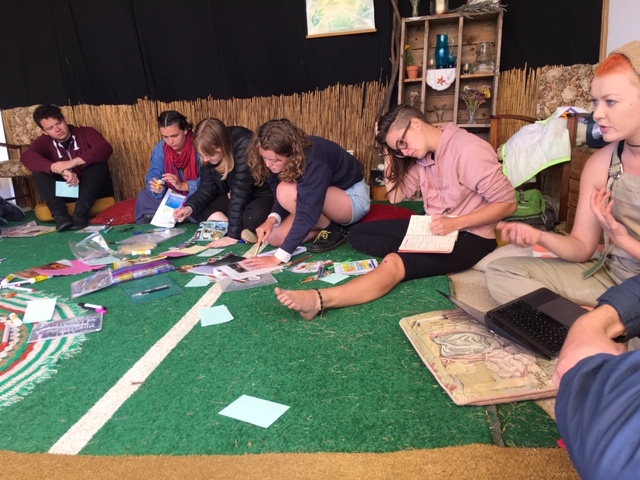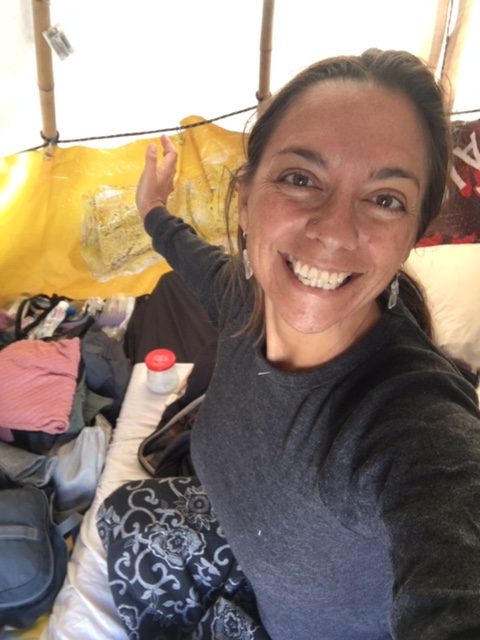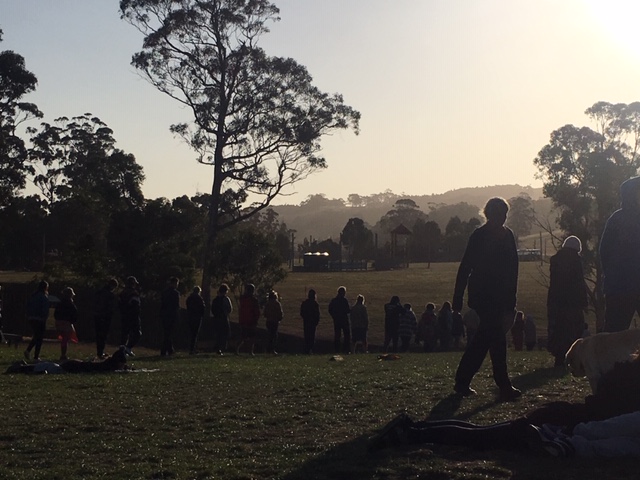It’s a good thing today wasn’t a bunch of rubbish at the Newkind Festival, because I wouldn’t have been able to throw it out. That’s because there are no trash bins at this festival. There are no recycling bins, either. There’s only a compost bin, and it’s located next to the dishwashing station. That’s right, this social justice conference-slash-festival is completely waste-free.
That was a surprising development to me, as someone who’s been to more than a hundred festivals. Some just heap rubbish in big piles, from which you are required to turn your head. Others create teams of volunteers to sort the trash to get all the recyclables out. But I’ve never been to one that simply did not have any trash.

The meals they served consisted of whole foods that came straight from the farmer or from bulk food. It was pretty standard fare: usually brown rice or millet with a vegetable stew, sometimes with chickpeas or lentils. There was a salad offered, along with tahini-based dressing and some seasoning. In the morning, there would be porridge and freshly baked bread, with peanut butter, muesli and jam. Coffee, teas and cacao were freshly topped up in reused glass jars.
There were no straws, cups, plates, utensils, napkins, paper towels or candy wrappers. Everyone was required to bring their own bowl, cup and utensils. We washed them with spray bottles – one with “bubs” and one with rinse water. It was an alcohol-free event, so there were no cans or bottles. Anything that you brought with you, you have to pack up and leave with when the festival ends tomorrow.
It’s Saturday night now, and I’ve been here since Monday. It’s pretty cool to realize that the only waste I created is actively composting at the bottom of the toilets. It made me realize that I could probably do this in my everyday life, too.
What does it take to be waste free? I attended an inspirational workshop with a woman named Asher, who goes by Naginya in her movement classes, and her partner, Che. Asher has been waste-free for eight years, and Che joined her two years ago. They had plenty of tips for not generating any waste in your life.

Before I get into the tips, think about how often you empty your trash. What’s in there? It’s likely a lot of food waste, first of all. The second most common thing in trash cans is plastic. You might be feeling good that you’re more likely to fill up your recycling bin (which is definitely where I am). But the reality is that most communities barely recycle 30 percent of their waste, and most of that is tree trimmings. That’s because there simply isn’t a big market for government and waste management agencies to sell glass, plastics, cardboard and cans. It’s expensive to separate everything out, and even when they do that there’s no guarantee that anyone wants to buy it. What happens if there’s no buyer for the, say, brown glass you throw in your bin? You guessed it: It’s just dumped in the landfill.
It’s easy to be bombarded with trash. All pre-packaged food, by definition, has packaging. Beauty products usually come in a box and a jar, and then of course when you buy it, the cashier puts it in a bag. Would you like a free sample with that? It’s just more trash. Junk mail – in fact, any mail – goes straight in the bin. I just took a flight. That airplane tag is unavoidable trash.
Somethings are unavoidable, but the majority of trash is completely unnecessary, especially if you are interested in living a healthier life. By now, I hope you are saying no to plastic straws, bringing your own reusable bags to the grocery store and having a reusable coffee cup for your hurried morning trips to the café. Water bottles can be filled quite easily in most places with drinkable water, even though we have spoiled ourselves by thinking we need spring water (which is often just good old tap water anyway). But are you bringing your own Tupperware for takeaway food? Are you making your own toothpaste? What about when you go shopping for groceries?
Being a conscious consumer is the first step. Recognizing all the packaging on the food and products you buy is a great start. Instead of buying the fruit that’s wrapped in plastic wrap and sitting on a Styrofoam container, just, you know, buy fruit and wash it. In Europe, people protest by throwing those containers back at the stores. Americans are too lazy to do that. They just think it’s OK to recycle it, but who’s buying old Styrofoam?
You can do more than that. You can shop at bulk food stores. Those are places where you fill up your own small cloth bags and old glass jars with dried beans, rice, laundry detergent, agave nectar and most other things you need to cook and bake all kinds of amazing meals at home. For produce, go to the farmer’s market with your own bags or even a wicker basket. Those farmers are happy to reuse their cardboard pints instead of giving it to you to throw away.
Besides buying the stuff you need smarter, there’s another level to reducing waste: Just stop consuming stuff. If I’m out and I am thirsty but I don’t have a water bottle, I usually just go thirsty for a bit. When I’m on a flight and they try to give me a pack of peanuts and a sip of water in a plastic throwaway cup, I refuse. Sometimes I ask them to fill up my reusable bottle with water, but usually I already did that before boarding my flight. I often tuck an apple in my bag if I think I’ll get hungry.
Thinking ahead is key. If you pack your own lunch, you won’t have any waste. If you have a healthy snack ready to go, you won’t need to buy a sugar-laden, fatty faux-food product at the convenience store. Being waste-free can help you be healthier and even save money, too.

That’s why I’m in. And so is my boyfriend! We have committed to dramatically reducing our waste. We both eat whole-food, plant-based diets, with intermittent fasting, so I’m hoping our lifestyle will make it easier. It will be interesting to track how we do by saving a month’s worth of trash. We’ll have to find community gardens to take our compost and search out bulk food stores on the road (There’s an app called Bulk that will help). But it’s a project that’s not only good for us, it’s good for the Earth.
And that’s just one thing that Newkind helped inspire in me. But I’ve recognized, too, the inter-connectivity of how caring for yourself, caring for your community and caring for the Earth all works together. The foundation to making a difference in the world is personal responsibility. I’m starting by going waste-free. Will you join me?
